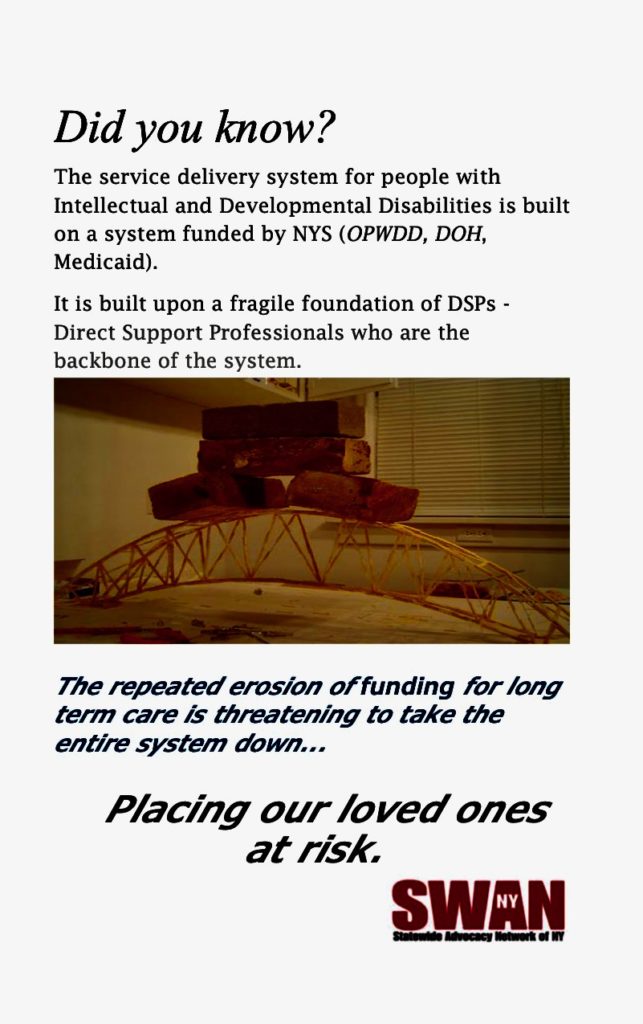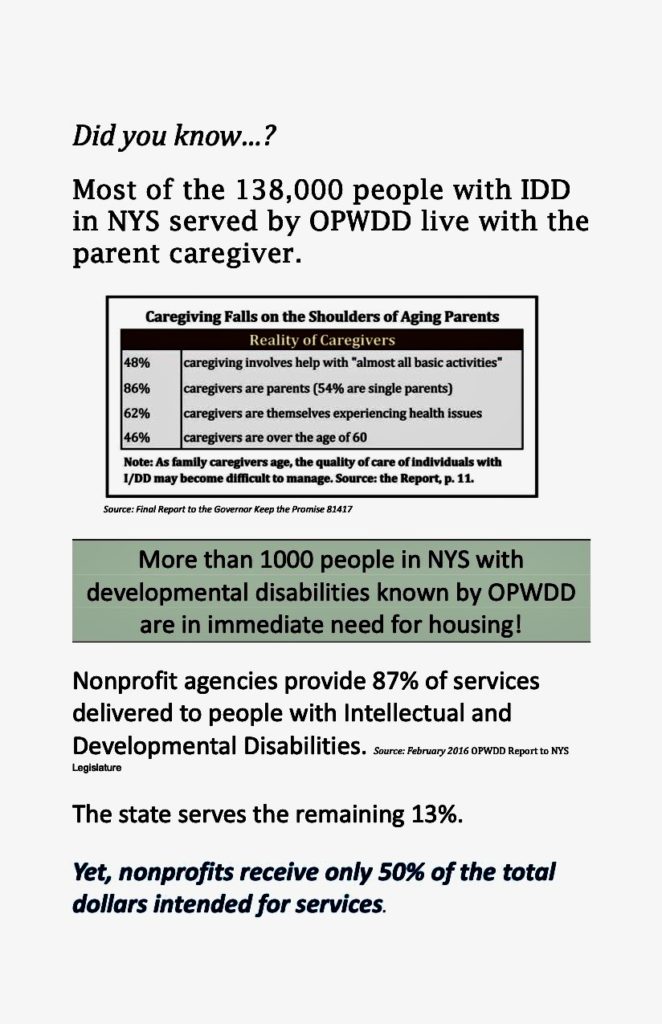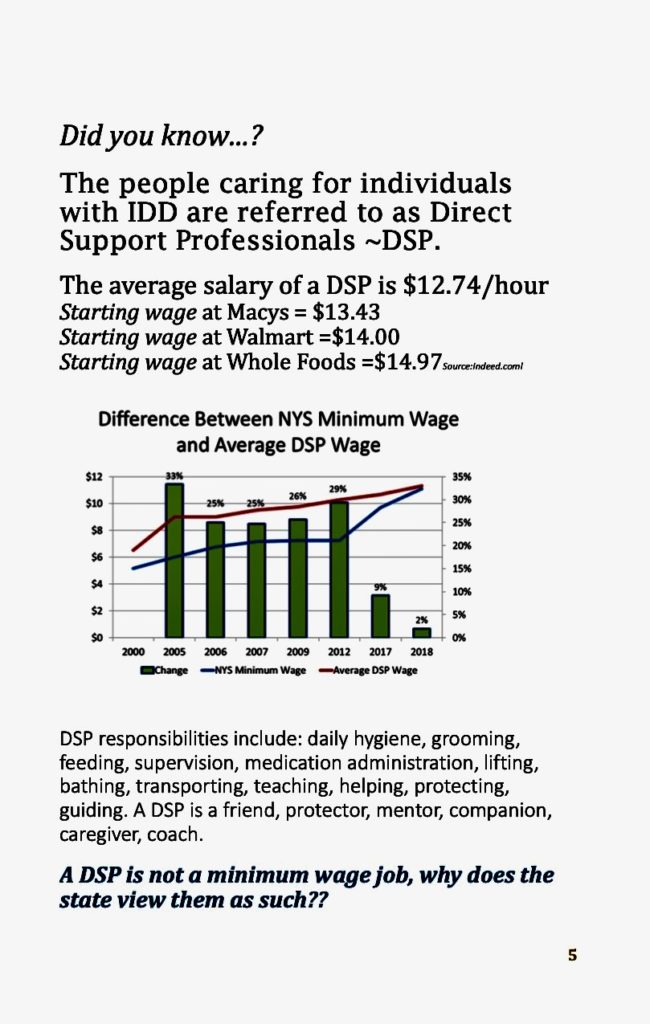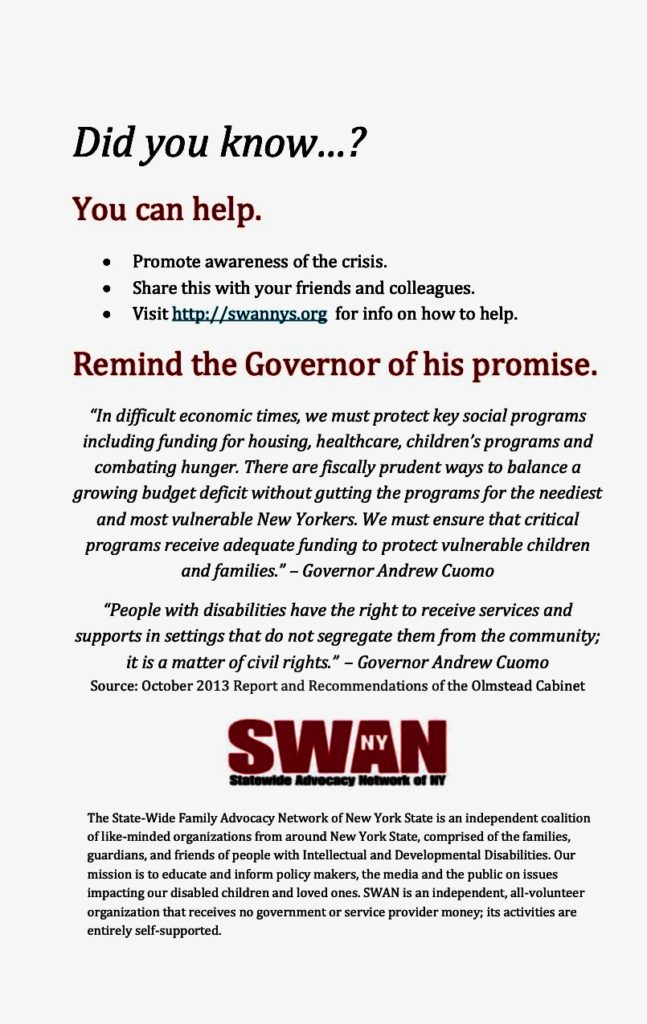



The Office for People with Developmental Disabilities (OPWDD) is THE voice and advocate in state government for the very unique needs of individuals with intellectual and developmental disabilities (IDD). We seek additional funding, as well as administrative and legislative support to sustain critically needed supports and services, and to address unmet need. Following years of imposed budget neutrality even as need has grown; it has become imperative that OPWDD’s budget be increased. Only this can ensure that essential services for our most vulnerable citizens are safeguarded despite the self-imposed Medicaid budget cap.
Sadly, the workforce crisis continues, as a result of both chronic inadequate state funding of nonprofit services for individuals with IDD and the raise in the minimum wage. There are still alarmingly high vacancy rates, staff turnover and work force gaps creating instability for our loved ones. This shortage contributes to gaps in oversight, lack of care continuity and increased training needs, all of which create additional invisible costs, increased risk for individuals and potential liability for the state. Efforts to finance, build and retain a strong workforce in the nonprofit sector for individuals with IDD are essential in sustaining New York’s service delivery system for our most vulnerable citizens.
Individuals with complex physical and/or behavioral needs require a significantly higher level of supports and services. Current rate rationalization models have made it increasingly impossible for these individuals to access appropriate services due to the increased cost and specialty of care they require. We seek either additional/ongoing funding to ensure appropriate, sustainable service delivery for our most complex individuals or “needs based” funding mechanisms to provide incentive and ensure sustainability of service delivery for all levels of complexity.
A new system of Care Management was introduced on July 1, 2018. This shifted Medicaid Service Coordination to seven new Care Coordination Organizations (CCO) that oversee Care Managers. They are a critically important component of access to and delivery of services. Unfortunately, this well intended consolidation has fallen far short of expectations. For many, the enhanced care management promised has been little more than an endless process of questionable assessments while many families have seen a revolving door of care managers. Accurate evaluation and assessment of need, as well as meaningful quality measures must be fully and effectively operational; technology across all systems needs to be aligned and integrated so as to provide for consistent, data driven enabling and quality control. Without this resolution, moving on to Managed Care is not advisable.
SWAN-legislative-messaging-1-14-20-FINAL-VERSION-2SWAN Sept 17 mtg with OPWDD FINAL
Meeting Summary – 9/17/18
Attendees: OPWDD – Acting Commissioner Kerry Delaney,Kate Marley, Neil Mitchell, Greg Roberts, Leslie Fuld , Roger Bearden, Abiba Kindo
SWAN: Brad Pivar, Pat Curran, Meri Krassner, Elly Rufer, Fran Kermian*, Kathy Bunce*, Jim Karpe*, Barb DeLong, (*via video/teleconference)
Note: Action items are in bold for quick reference
Discussed the draft of NYS Medicaid Managed Care Organization I/DD System Transformation Requirements (SIP-PL) out for public comment. Kerry acknowledged our request for an extension on the time period and advised us that there would be a two-week extension that will announced formally shortly. Further she emphasized that they will always take feedback regardless of published deadlines.
Kerry also shared that they are working on a simple summary presentation to educate families on the upcoming changes which would be posted to their website so families could see it. . She asked SWAN to gather what we think would be FAQ’s from a family or individual’s perspective as well as areas of concern so they can be addressed. Requested one-week turnaround which later was revised to ASAP. SWAN members forwarded their input to Greg Roberts directly.
The Coordinated Assessment Tool (CAS) was discussed. Many members of SWAN have had an opportunity to experience the CAS in the last 3 months. We shared our various experiences and Kerry indicated that the CAS leadership team in Albany absolutely needs to hear feedback from the experience and where the CAS failed to describe the person accurately. Furthermore, she heard us on the problem of amending the CAS and the need for a clear amendment process. It is unknown WHEN/IF the CAS is replacing the DDP-2. Further, she said the CAS was not intended to determine individual budgets but rather rate setting. ACTION: Kate/Diane will schedule a meeting with SWAN about the CAS.
CCO implementation was discussed. OPWDD acknowledged that they were aware of Medisked having issues but to their knowledge they indicated things were resolved. They understand there has been significant frustration and are meeting with CCOs weekly, however the Medisked issues have to be resolved between the CCO’s and the vendor directly.
In addition OPWDD acknowledged the pain families are experiencing with the requirement to change Care Manager based on Tier level. OPWDD indicated that they are working with the CCO’s to devise strategies to allow some flexibility with case load, team assignments, etc.
Discussion regarding the expectation of CCO’s evolving into MCO’s. OPWDD indicated it was hard to tell how it will evolve – their preference would be for providers to apply. They mentioned that CCO’s may incorporate into a different entity apply as well. They expect their will be three MCO’s.
Workgroups were discussed and SWAN’s disappointment that it appeared that all the work fell into a black hole. Kerry indicated that final drafts will go back to each workgroup. Further ALL drafts will go to all SWAN members. In the process of prioritizing them, they will be implementing those recommendations that do not have fiscal impact and then determining if there are funds to cover other recommendations. Kerry also indicated that all workgroup leads would be required to present the items to their workgroup. Tamika Black is Deputy Commissioner of Quality.
We discussed the ongoing workforce crisis and how desperate families and individuals are feeling. Kerry agreed and indicated that as a field, we need to come together to discuss how to make it better in a proactive fashion. Kerry will request Sharon to send the workforce report to Brad. (He will forward to SWAN). In addition, SWAN shared that Self Direction is in general, broken.
We talked about the various organizational changes and our concern that so much institutional knowledge is walking out the door. We further expressed our continued expectation that OPWDD remains as its own entity and not be swallowed up by DOH. Kerry indicated that it will continue as its own entity and that DOH is deferential to OPWDD’s experience.
Kerry suggested that we should have monthly teleconferences to insure communication channels are open. She will have Suzanne set them up and advise us and that they are very helpful in dealing with CMS.
SWAN asked Kerry who in DOH should we be reaching out to inform/educate/advocate with. Kerry will advise.
Dated: 9/24/18
SWAN April 19 2018 mtg with OPWDD
Meeting held on April 19, 2018
Attendees: OPWDD – Acting Commissioner Kerry Delaney, JoAnn Lamphere, Jay Kiyonga, Kate Bishop, Neil Mitchell, Meagan O’Conner, Greg Roberts,
SWAN: Brad Pivar, Pat Curran, Kathy Bunce*, Jim Karpe*, Meri Krassner*, Roy Probeyan*, Fran Kermian*, Dan Maillet* (*via teleconference)
Meeting held on April 19, 2018
Attendees: OPWDD – Acting Commissioner Kerry Delaney, JoAnn Lamphere, Jay Kiyonga, Kate Bishop, Neil Mitchell, Meagan O’Conner, Greg Roberts,
SWAN: Brad Pivar, Pat Curran, Kathy Bunce*, Jim Karpe*, Meri Krassner*, Roy Probeyan*, Fran Kermian*, Dan Maillet* (*via teleconference)
Update on open action items:
New Business:
.
Dated: 4/30/2018
New Business:
.
Dated: 4/30/2018
SWAN – CAS White paper 11-15-2017 FINAL
The Coordinated Assessment System (CAS) is becoming the standard tool used by OPWDD (New York State’s Office of People With Developmental Disabilities) to determine the care needed for an individual with an Intellectual and/or Development Disability (I/DD).
OPWDD must make significant and immediate course corrections to this process.
The concerned parents and family members of New York State want to ensure the CAS is
We are most concerned about the process for amending a CAS report. Any assessment tool will sometimes fail, and consequently there must be a process to correct inaccuracies. Assessments of people with I/DD are especially prone to error, due to the high degree of variability in this population– variations in health, behavior, physical ability and cognition.
Recent presentations by senior OPWDD personnel have pointed to the low rate of reported problems as evidence of the accuracy of CAS. Unfortunately, the low rate of reports is actually evidence of the imperfections in the current complaint and appeals process. The Medicaid Service Coordinator (MSC) is supposed to discuss the CAS results with the individual and their family within a few days of the completion of the report. The MSC is then supposed to inform OPWDD about any problems and report them to coordinated.assessment@opwdd.ny.gov, the designated email address for complaints and problems.
In practice, the process for error detection and correction can break down in many ways, including:
Families and providers have complained that behavioral issues and physical limitations have not been explored. “Sub-assessments” may not have been executed, even when clearly called for. Some assessors act as if they are compensated based on the number of completed assessments, and not on their accuracy. If this is true, it is ironic that as we start the process of converting to a Value-Based system, we are falling into the same old trap by rewarding Assessors for volume.
It is important to include support staff at the time of the assessment since the term “circle of support” may be interpreted by families to mean only friends and family.
Aside from problems with administration, the instrument itself is not fine-grained enough. Tasks are not broken down into sufficient detail, and the categories are too broad. Examples:
Overall, the assessment often produces an inaccurate view of the individual. Someone who cannot feed or toilet themselves may be improperly classified as not needing support for these vital activities because they can do part of the task.
Given that the CAS instrument itself is unlikely to be revised, there must be a path which allows for corrections when needed through additional evidence. In some cases that will have to include supplemental assessments, including adaptive behavior scales such as a Vineland Adaptive Behavior Scale, ABAS®-III, SIBͲR, ABESͲR2, or ABDS